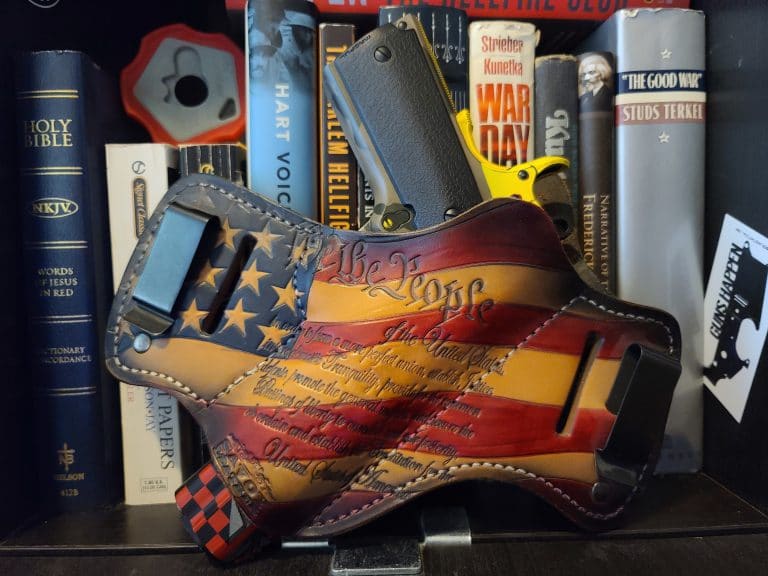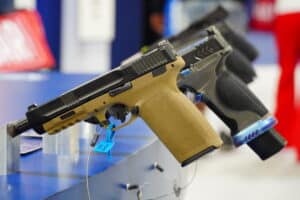New York’s attempt to restrict gun carry after its previous law was struck down by the Supreme Court has failed.
Federal district judge Glenn Suddaby issued a temporary restraining order against the state’s enforcement of most provisions in the Concealed Carry Improvement Act (CCIA). He found all of the novel policies restricting gun carry by those with valid permits were unconstitutional under the standard set in New York State Pistol and Rifle Association v. Bruen, though he also upheld some more common regulations.
“Simply stated, instead of moving toward becoming a shall-issue jurisdiction, New York State has further entrenched itself as a shall-not-issue jurisdiction,” Suddaby wrote. “And, by doing so, it has further reduced a first-class constitutional right to bear arms in public for self-defense (which, during the 19th and 18th centuries in America, generally came with an assumption that law-abiding responsible citizens were not a danger to themselves or others unless there was specific ground for a contrary finding) into a mere request (which is burdened with a presumption of dangerousness and the need to show ‘good moral character’).”
The ruling represents a further victory for gun-rights advocates who have challenged severe restrictions on gun carry and a further setback for states that have sought to severely limit who can carry a gun and where they can carry it. Judge Suddaby’s decision is also one of the first to apply the Bruen standard to a gun-carry law passed in response to the ruling. It could serve as a guide for other federal courts across the country dealing with challenges to similar laws.
Suddaby ruled the state could not enforce its “good moral character” clause unless there is a preponderance of evidence the applicant is a threat to others with the exception of self-defense. He blocked the requirement that applicants turn over their social media history and information on others who live with them. He also blocked the CCIA’s requirement that applicants meet with permitting officials for an in-person interview,
The CCIA’s “sensitive places” restrictions were also called into question by Suddaby. He found most of the state’s expansive list of areas where guns were completely off-limits was overly broad. He blocked restrictions on gun carry in all of Times Square, on public transit, and in private businesses without a specific gun policy.
“Although historical analogues certainly exist prohibiting carrying firearms in specific places, no historical analogues have been provided prohibiting carrying firearms virtually everywhere, as the CCIA does,” Suddaby wrote.
Suddaby upheld gun-carry restrictions in places such as schools, government buildings, polling places, special permitted events with no-gun signs posted, protests, and fenced-in farmland. He also upheld the state’s new training requirements. Though, most of those restrictions are common in other states.
He argued the temporary restraining order was necessary to prevent harm to the plaintiffs in the case.
“Under the circumstances, the fact that Plaintiffs may stand an even greater chance of being arrested (or having an application ignored) later (during the period of time between a hearing on their motion for a Preliminary Injunction and the final disposition of this action) than now (during the period of time between now and when their motion for a Temporary Restraining Order) in no way diminishes the fact that they stand a sufficient chance of being arrested or having their application ignored now,” Suddaby wrote.
Gun-rights advocates celebrated the ruling as a win for the Second Amendment.
“New York doubled down to infringe on the Second Amendment in direct contradiction of the edicts from the U.S. Supreme Court. GOA and GOF are thankful to be vindicated by Judge Suddaby, who helped restore gun rights today,” Sam Paredes, a board member for the plaintiff Gun Owners Foundation, said in a statement. “GOA and GOF will continue to fight for the rights of the people until Albany sets aside anti-gun hysteria and supports their citizens’ unalienable right to self-defense, as guaranteed by the Second Amendment.”
New York Governor Kathy Hochul (D.), who was a major proponent of the law, did not respond to a request for comment.
Judge Suddaby stayed his temporary restraining order for three days in order to provide New York with a chance to appeal the ruling up to the Second Circuit Court of Appeals.






